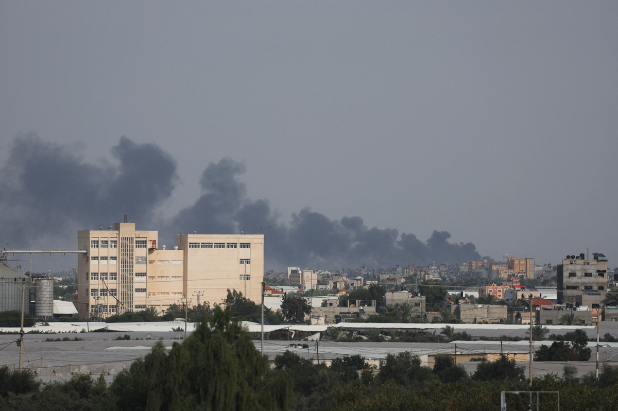By Mohamed El-Bendary
There is rising hope of reaching a cease-fire in Gaza, with negotiators meeting in Paris on Saturday agreeing on a new Palestinian-Israeli deal for the release of hostages held by Hamas in return for a temporary cease-fire and the release of Palestinian prisoners.
The meeting – which was attended by officials from the United States, Israel, Qatar and Egypt – was launched on Friday amid intense fears of a looming Israeli ground offensive on Gaza’s southernmost city of Rafah.
It was the latest of a series of endeavors aiming at reaching a cease-fire deal before the commencing of Ramadan around March 10, a month during which Muslims fast from sunrise to sunset.
Reports were released by the Egyptian and Israeli media of significant progress being made during the Paris meeting by the four countries’ spy chiefs, diplomats and military officials. According to Egyptian sources, Hamas will release up to 40 Israeli women and senior hostages in return for Israel freeing up to 300 Palestinian prisoners held by Israel, mostly women, minors and older people. Aid trucks will also be permitted to enter Gaza daily.
There remains, however, concern among Egyptians that Israel’s continuing killing and displacement of Palestinians can diminish the Paris summit’s efforts in containing the war in Gaza. On Saturday alone, Israel killed 92 Palestinians. Furthermore, and to the dismay of many Arabs, the United States vetoed on Feb. 20 an Arab-sponsored and widely-backed UN resolution that calls for an immediate humanitarian cease-fire in Gaza. Of the 13 countries that voted, only the US voted against the resolution.
Forming an international consensus is vital for reaching a humanitarian cease-fire in Gaza and striking a final agreement that ends a war in which nearly 30,000 Palestinians – mostly women and children – have been killed and 70,000 wounded since violence erupted on October 7. Gazans, particularly in Rafah, and in which currently more than half of Gaza’s population are sheltering, live under severe humanitarian conditions with civilians fighting to get their basic food needs and medicine.
The UN Relief and Works Agency (UNRWA) stated on Saturday that Israeli airstrikes on Rafah is harming the delivery of aid to Gazans because of critical conditions in the north. This is making Egyptians – on whose country’s door the Gaza war has been knocking –facing a challenge, a dilemma, on how to tackle the humanitarian disaster on its border, with Cairo stating on Saturday that it plans to build a second camp for displaced Palestinians in the southern city of Khan Younis.
Arab leaders – including those whose countries are at peace with Israel, such as Egypt and Jordan – have been scolding Western countries for their silence on the Israeli airstrikes on Gazan civilians. Citing Washington’s continued rejection of UN resolutions that call for an immediate, humanitarian cease-fire in Gaza, Egyptians have lately been talking of two US manufactured conspiracies: The first aims at liquidating the Palestinian cause in a way that makes Palestinian land fall under Israeli ownership; the second is the exportation of all of the problems of Palestinian factions to Egypt.
President Abdel Fattah El Sisi has repeatedly denounced Israel’s blockade on Gaza as just another effort to force Egypt to accept masses of Gazan refugees through its borders on the Sinai Peninsula and prevent them from returning. He stressed during the Cairo summit in October that “liquidation of the Palestinian cause without a just solution will not happen”, and that such an act would endanger Palestinians’ quest for a homeland and expand the conflict in a way that threatens the peace and stability of the entire Middle East.
Ending the war in Gaza is vital for Egypt, which is facing dire economic circumstances and fears that an influx of more refugees could add to its burden. There is also concern about insecurity – about the Israeli-Hamas conflict reaching its borders as witnessed previously in rockets hitting two Egyptian Red Sea towns and Egyptian border guards being accidently hit by fragments of shells from an Israeli tank.
Yet, and considering its diplomatic weight in the Middle East, Egypt should continue to play a positive role in seeking a solution for the Palestinian cause based on the pre-1967 borders. Washington and Tel Aviv should also by now realize that only by establishing a Palestinian state with East Jerusalem as its capital can there be a durable peace between Palestinians and Israelis – between Arabs and Israelis. Or else the Middle East could dive into more conflicts and we witness the outbreak of a wider regional war.
Unless and until Washington plays a more active and balanced role in ending the war in Gaza and reviving Palestinian-Israeli peace talks, Washington will continue to lack a moral compass in guiding its foreign policy in the Middle East. So, let’s hope that the Paris summit will end with a breakthrough and finally put an end to the four-month long war. (This story was first published by China Daily).


